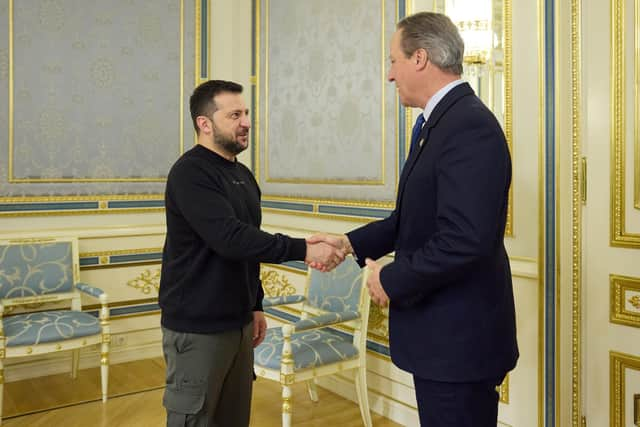Delaying elections in Ukraine would not be a good look for President Zelensky - Patrick Mercer
Others are more sceptical, saying that this meeting hinged around the Ukrainian leader’s intention to carry out his threat and suspend elections in his country whilst at war.
Obviously, we will never know exactly what was said, but any future membership of both NATO and the EU requires Kiev to evolve into a demonstrable democracy so, delay of a free vote is not a good look.
Advertisement
Hide AdAdvertisement
Hide AdWhat we do know is that another tranche of money will be given by the US to Ukraine along with more weapons. The trouble is that the dollars amount to no more than enough to sustain Kiev’s war efforts for more than three days and there was only one HIMAR (the long range rocket launcher that has caused Russia so many headaches) promised to replace the several that have been destroyed.


The spin doesn’t matter, though, for Mr Austin - quite properly - really does have his mind in another place. It’s a remarkable tribute to President Zelensky that the defence secretary visited at all when he had just ordered the most powerful naval force in the world into the most dangerous waters in the world.
Led by the Eisenhower aircraft carrier, a flotilla of powerful warships have cruised into the Gulf of Oman and are now looking straight into the teeth of the Strait of Hormuz. There can be only one purpose for the fleet’s presence there: a proposed or actual strike on Iran. Whilst the ships remain beyond the Strait they are simply threatening, but should they cruise into the Gulf of Oman war is imminent.
And be in no doubt, an exchange of fire between America and Iran would draw most of the Middle Eastern countries into the fray whilst, with her interests in Syria in danger, Russia would also be actively involved. So, whilst President Zelensky might clamour for attention, the super powers suddenly have their hands full with yet another crisis which is even more pressing than events in the Donbas.
Advertisement
Hide AdAdvertisement
Hide AdLeft holding the baby all by himself, Ukraine’s leader is now having to handle some very difficult crises beyond the battlefields. First, rumours continue to swirl about political tensions in Bankova Street - Kiev’s Whitehall.
Central to the election issue is President Zelensky’s dwindling support at home and whilst polls are extremely sketchy in war torn Ukraine, it does seem that a substantial majority of people would now prefer General Zaluzhnyi - the current boss of the armed forces - as their future leader. A good reason you might think for President Zelensky to avoid a free election.
Meanwhile, it has also been suggested that the USA might prefer someone who is more biddable than Zelensky and less of a liability. There’s no doubt that the leader of Ukraine’s enthusiastic support for a former Nazi SS soldier who was presented to the Canadian Parliament when President Zelensky was visiting Ottawa in September was extremely unfortunate. This has left a deep scar on Washington’s attitudes towards him.
Coupled to this, though, are Russian missile stocks. Estimates vary, but the Kremlin has certainly been hoarding ballistic weapons with a view, it’s thought, to striking Ukraine’s energy infrastructure in the same way as they did last winter, but in a much more dangerous way.
Advertisement
Hide AdAdvertisement
Hide AdIf - the reasoning goes - the lights, heating and trains can be knocked out across Ukraine not just for days, but for weeks or even months, then not only will it be impossible for Kiev to move troops about, but living conditions will become unbearable.
Russian assumptions seem to be that a war weary, decimated population will rise up against their government when they have neither energy nor food to combat the depths of winter. Clearly, it’s easier for President Putin if the Ukrainians achieve their own change of regime rather than sacrificing further Russian lives.
And there are more complications. President Zelensky is now trying to replace the middle tiers of his military leadership, with many of those who have been sacked being in General Zaluzhnyi’s camp.
The official reasoning for this is the failure of Kiev’s summer offensive, but the purge is being interpreted by some as nakedly political: it’s even been suggested that Mr Austin’s visit has involved cautionary words to President Zelensky about his waywardness.
Advertisement
Hide AdAdvertisement
Hide AdThen there’s another subtext involving the conduct last week of a Ukrainian pilot who flew his Su24 fighter into Russian territory and defected. On the surface there’s nothing especially remarkable about this as it’s happened before, but this is rather different: the pilot had started training on the F16 aircraft which are about to be delivered from the US.
Casualties amongst Kiev’s aircrew have been devastating and there are only a handful who are suitable to be retrained on this new and highly complex aircraft.
Obviously, each and every pilot will now have to be vetted yet again: imagine one of these precious weapons being delivered straight to Moscow. Much hope and faith has been invested in these planes and now a further delay has been imposed on their arrival on the battlefield.
As the thermometer drops and the ground hardens in Ukraine so the temperature climbs in the Middle East.
Patrick Mercer is a former MP for Newark and Army colonel.